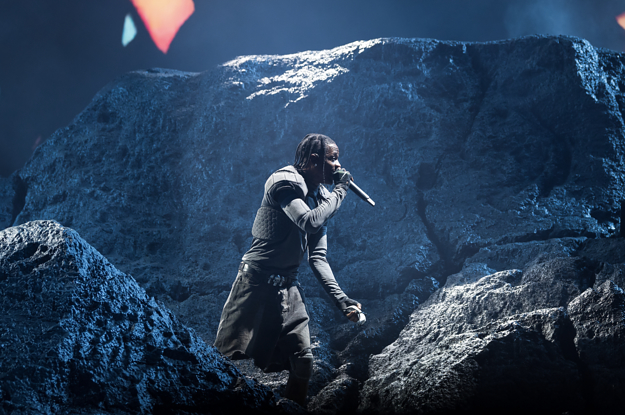Last week, Travis Scott’s Utopia release concert came to an end before it could even begin. After a couple of weeks of uncertainty surrounding his planned performance at Egypt’s Great Pyramid of Giza, La Flame announced that the show wouldn’t be happening—at least not on its planned date of July 28.
“Egypt at the pyramids will happen, but due to demand and detail logistics, they just need a bit a time to set lay on lands. I will keep u posted on a date which will be soon love you all,” he wrote on July 26. While his explanation is in line with Live Nation’s statement on the matter, the plot appears to be much thicker.
Before Scott or Live Nation addressed the concert, the Egyptian Musicians Syndicate issued a statement explaining they had canceled the Houston rapper’s license for the concert, and their explanation had nothing to do with show logistics.
“After examining social media opinions and feedback, as well as the news circulating on search engines and social media platforms, which included authenticated images and information about peculiar rituals performed by the star during his performance, contradicting our authentic societal values and traditions, the Syndicate’s president and board of directors have decided to cancel the license issued for hosting this type of concert, which goes against the cultural identity of the Egyptian people,” the Syndicate said.
For his part, in his own statement, Scott claimed that the social media posts were generated by bots before dismissing claims of any ulterior motives or messages with his shows.
“Nothing could be further from the truth,” Scott says in the statement. “My only intent with live performances is to unite people around the world over a shared bond in music. As a matter of fact, I just successfully played in an incredibly conservative Saudi Arabia in April for a crowd of 70,000 fans and there was no issue, hiccup or complication whatsoever. (Ask their Minister of Culture Prince Bader bin Farhan Al-Saud or see the positive press reviews here). My music brings together all cultures and spreads positive messages of empowerment and creative freedom. There is not a single lyric I have written or recording I have made that advocates or endorses anything derogatory to any people, much less the Egyptian people. Nothing in my music lends itself to any kind of “strange ritual.” My performances are celebrations. I only want to lift people up. My new album is entitled ’Utopia,’ which is emblematic of my desire to accomplish that goal. I am a great admirer of Egyptian culture and history. That is why I selected the iconic Pyramids of Giza to perform and preview my first album release in five years. It means that much to me.”
Amid numerous cancellations and contradicting messaging, the Syndicate’s vague statement sparks more questions than answers. What are the “peculiar rituals” they speak of? What are their “authentic societal values and traditions,” and what about Scott’s mid-show theatrics are at odds with them?
To date, other American acts like the Grateful Dead (1978) and Mariah Carey (2010) have been able to take the stage at Giza, so what about Travis Scott’s brand of showmanship made the notion of his performance so unacceptable?
The answer seems to be a layered one, rooted in regional politics and perceived occult symbolism that goes back decades. In conversation with experts on Middle Eastern culture, we address the underlying question: Why can’t Travis Scott perform at the pyramids?




